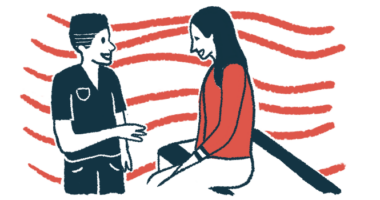A Book Club for the Bedridden

My husband, Ronald, and I hit the road years ago, chasing work, vistas — anything but another day in the office. Exciting? Sometimes. But in between the last sales meeting and the next roadside attraction were hours of highways and byways. Radio was local then and faded quickly as the towns receded in the rearview mirrors of our “happy van.”
To fill time, I read out loud. Give it to Annie, she’ll read anything — the newspaper from the hotel desk, the tourist guide from the rest stop, the ingredients on the junk food wrappers. But our favorites were the well-crafted novels with eccentrics bumbling through life in just the sorts of towns we were speeding past.
My husband would set the cruise control while I read a few chapters of “A Confederacy of Dunces,” “Handling Sin,” or “Forrest Gump.” These were active misadventures that made my audience of one laugh so hard I learned to close the book in heavy traffic.
Becoming a caregiver
Then came syndicated talk radio, satellite music stations, laptops, and cellphones. We were constantly informed, entertained, and working. Our story hours took a 20-year hiatus. Then came Ronald’s diagnosis of atypical hemolytic uremic syndrome. We put the SUV in park, and I became a caregiver — and had time to read again.
During this slow journey, I discovered a genre of literature in which real characters cope with the tragicomedy of difficult diagnoses. We revived the habit of reading aloud, me silently filling hours of vigil while he slept, then sharing a few pertinent paragraphs with him when he awoke.
There were many gems gleaned from since-discarded or regifted volumes. But there were a few whole books with honest stories and beautiful storytelling that I rank as classic and would recommend to anyone in bed or in the chair beside it.
‘God’s Hotel’
Victoria Sweet is a physician who chronicles life in the last almshouse, or charity hospital. Here, the unhealthy and unfortunate lived for extended periods where nothing was private and everything was personal. Medicine was based more on care than cure for these chronic cases.
One of the author’s patients lost one leg, then the other, and was understandably angry. In a poignant vignette, she asked if there was anything he wanted for Christmas. A fishing vest, was his curious reply. Why, she wondered, oblivious as doctors can be to the details of the lives they save. Without legs he no longer wore pants, thus no longer had pockets in which to put the stuff he wanted with him as he learned to navigate life in a wheelchair.
The author is a humble student of her patients. She shares many stories of taking time to learn from their experience and wisdom, which she juxtaposes against the rush of society to embrace every advance in modern medicine.
‘God Rides a Yamaha’
Kathy Shaidle was in her late 20s when she landed her first professional writing gig. The club scene not quite behind her, the book tour not yet guaranteed, she was savoring the transition from cool to cultured when an odd sunburn that wouldn’t go away was diagnosed as lupus.
She writes as if in a journal or to a friend, and probably over a beer in either case. Her tone is edgy and raw, seeking and cynical. She writes about medicines and side effects, meditations and martyrs. A fan of old B-movies, French philosophers, and Leonard Cohen, she has little patience with New Age healers, does her best with physiotherapy, and just plain detests being sick.
But she sees the dark humor in it all and gets a book out of it. Way to go, girl!
‘Living Well Is the Best Revenge’
Calvin Tomkins met his neighbors, Gerald and Sarah Murphy, when his young daughters wandered next door and chatted them up. Little did he realize this couple, in their 60s, had been the center of the social circle of the expatriates in the south of France in the Roaring ’20s.
These two, who had befriended and entertained the likes of F. Scott and Zelda, and Hemingway, Picasso, and their first wives, were now serving ginger ale to the author’s preschoolers. They also had lost two of their own children, one to a long battle with tuberculosis and the other to a quick case of meningitis.
The Murphys had provided a familial foundation to the flaky artistic community that created a celebrated cultural legacy. At the same time, their family endured seemingly unbearable but little known trials, resulting in the end of Gerald’s own artistic output and the couple’s gracious acceptance of the duties and joys their life had to offer.
These three books are easy reads in length and vocabulary, even as they tackle profoundly difficult situations. Open, honest, realistic, and even surprising, they make great companions for the convalescent and the caregiver.
***
Note: aHUS News is strictly a news and information website about the disease. It does not provide medical advice, diagnosis, or treatment. This content is not intended to be a substitute for professional medical advice, diagnosis, or treatment. Always seek the advice of your physician or other qualified health provider with any questions you may have regarding a medical condition. Never disregard professional medical advice or delay in seeking it because of something you have read on this website. The opinions expressed in this column are not those of aHUS News or its parent company, Bionews, and are intended to spark discussion about issues pertaining to aHUS.








Leave a comment
Fill in the required fields to post. Your email address will not be published.